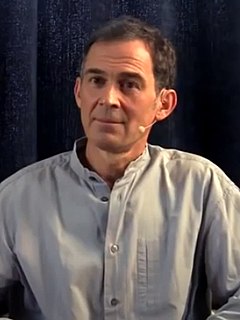A Quote by J. M. Coetzee
They have no consciousness therefore. Therefore what? Therefore we are free to use them for our own ends? Therefore we are free to kill them? Why? What is so special about the form of consciousness we recognize that makes killing a bearer of it a crime while killing an animal goes unpunished?...all this discussion of consciousness and whether animals have it is just a smokescreen. At bottom we protect our own kind. Thumbs up to human babies, thumbs down to veal calves.
Related Quotes
Therefore the Sage embraces Unity, and is a model for all under Heaven. He is free from self-display, therefore he shines forth; from self-assertion, therefore he is distinguished; from self-glorification, therefore he has merit; from self-exaltation, therefore he rises superior to all. Inasmuch as he does not strive, there is no one in the world who can strive with him.
We live in a society that will send us to prison if we make use of time-honored sacred plants to explore our own consciousness. Yet surely the exploration and expansion of the miracle of our consciousness is the essence of what it is to be human? By demonstrating and persecuting whole areas of consciousness, we may be denying ourselves the next vital step in our own evolution.
According to the true Indian view, our consciousness of the world, merely as the sum total of things that exist, and as governed by laws, is imperfect. But it is perfect when our consciousness realizes all things as spiritually one with it, and therefore capable of giving us joy. For us the highest purpose of this world is not merely living in it, knowing it and making use of it, but realizing our own selves in it through expansion of sympathy; not alienating ourselves from it and dominating it, but comprehending and uniting it with ourselves in perfect union.
How do you get from, "We do not know whether this is protectable human life," to "Therefore, we will not protect it?" Wouldn't the logic just as likely (some would say far more likely) be, "Since we do not know whether this is protectable human life, therefore we will protect it?" Why does the judicial uncertainty about the humanity of the unborn lead to unbridled license to destroy it?
Either we have an immortal soul, or we have not. If we have not, we are beasts,--the first and the wisest of beasts, it may be, but still true beasts. We shall only differ in degree and not in kind,--just as the elephant differs from the slug. But by the concession of the materialists of all the schools, or almost all, we are not of the same kind as beasts, and this also we say from our own consciousness. Therefore, methinks, it must be the possession of the soul within us that makes the difference.
This world, this universe which our senses feel, or our mind thinks, is but one atom, so to say, of the Infinite, projected on to the plane of consciousness; and within that narrow limit, defined by the network of consciousness, works our reason, and not beyond. Therefore, there must be some other instrument to take us beyond, and that instrument is called inspiration.
Now, you receive all your ideas; therefore you receive your wish, you wish therefore necessarily. The word "liberty" does not therefore belong in any way to your will....The will, therefore, is not a faculty that one can call free. A free will is an expression absolutely void of sense, and what the scholastics have called will of indifference, that is to say willing without cause, is a chimera unworthy of being combated.
One can ask why the I has to appear in the cogito {Descartes’ argument “I think therefore I am.}, since the cogito, if used rightly, is the awareness of pure consciousness, not directed at any fact or action. In fact the I is not necessary here, since it is never united directly to consciousness. One can even imagine a pure and self-aware consciousness which thinks of itself as impersonal spontaneity.






































